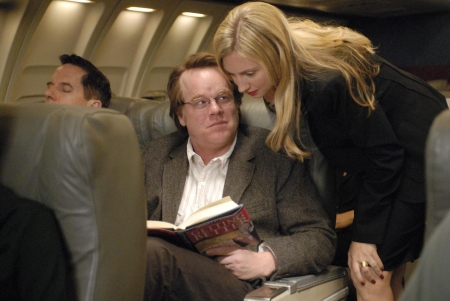
Synecdoche, New York is my favourite sort of movie: it exists on the edge of reality, its existence only confirmed by the fact that I saw it with a friend. It's also got another thing going for it that makes it harder to write about: the less that you know of Synecdoche, New York, the more liable you are to be surprised.
Either that or pissed off and feeling like Charlie Kaufman has wasted more than twenty years of your life. That's the beauty of the movies: you can feel strongly one way or the other. Hatred is still a response, and it's far better than apathy.
Caden Cotard (Philip Seymour Hoffman) is a theatre director in an unhappy marriage to his artist wife, Adele Lack (Catherine Keener). When Adele takes their daughter to her art show in Berlin and tells Caden to stay behind, he decides to create a play that means something and, in the process, find himself.
That's the basic idea. It doesn't really encapsulate Synecdoche, New York, a movie that is simultaneously beautiful, profound and confusing. There was so much that I expected of this film as a simple cinematic matter of course that simply never happened. Â I shouldn't have been surprised, seeing as this is as Charlie Kaufman movie and nothing should be taken for granted, but I was. In a world of depressingly paint by numbers films, Â Synecdoche, New York is a wonderful piece of surprise cinema.
What makes it work is that while the film doesn't make literal sense it has a strong sense of internal logic, and only compromises that for a joke towards the end of the piece that made me swear with laughter (believe me, it's possible) … and that joke, in turn, makes its own sense.
I realise that it's not very helpful to label something beautiful without explaining precisely why it is, but I can give you a few hints. Philip Seymour Hoffman is as good as he always is, here playing a man who is both thoroughly unlikeable and entirely sympathetic, and he's more than capable of carrying the film. The rest of the cast is exactly the sort of amazing ensemble that gravitates towards this sort of film, with Samantha Morton, Hope Davis, Michelle Williams and Dianne Wiest as particular standouts.
Kaufman acquits himself as a fine director in this, his debut, and in a way that entirely distances this work from Eternal Sunshine of the Spotless Mind. I fear that Michel Gondry would have ruined this with too much emphasis on dream logic and weirdness for its own sake; Kaufman presents a slightly surreal reality, but never one that annoys. Trying to unravel the reality of the situation becomes a task but not a chore, and it's difficult to think of a recent film as utterly engaging as this one. The film rewards observation and keeps on giving while never revealing all of tis secrets.
I deliberately didn't do any research into this film for writing this, because I wanted to maintain a clarity and purity of my own vision. The more I think of Synecdoche, New York, the more I love it. Charlie Kaufman has long made movies that have spoken to me, before I even knew that a movie could speak to me. There's a grain of truth beneath all of the obfuscation, as well as hovering on top of it. The entire exercise is an inscrutable mystery, one that you have to solve for yourself because Kaufman's really not going to help you, and nor should he.
The film fades to white, and upon the blank canvas of the credits you have to process what it is you've just seen. You can instantly write it off as pretentious filth, or perhaps you could take it with you as something special to cherish and ponder long after it's over. Whatever Synecdoche, New York is, it's quite unlike anything else … and, regardless of what you think of the finished product, that makes it entirely worth experiencing.
